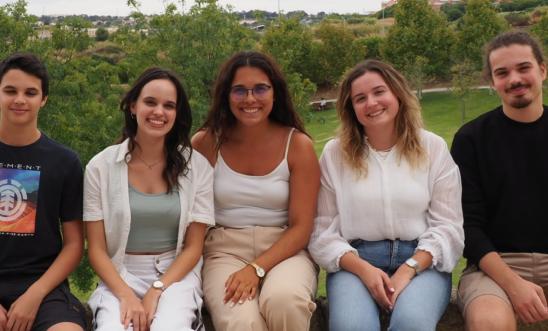
Press releases
Europe: Six young people take 32 countries to European Court of Human Rights over climate change

Group will argue in landmark case that government inaction on climate change discriminates against youth
If successful, countries including the UK could be legally required to reduce greenhouse gas emissions
‘As in many other places young people are leading the way and demonstrating that there are legal avenues through which climate justice can be achieved’ - Mandi Mudarikwa
Six young people from Portugal will present a landmark case tomorrow (27 Sep) before the European Court of Human Rights tomorrow arguing that countries are breaching their human rights by failing to do enough to protect them from climate change.
If they are successful, the 27 EU member states, as well the United Kingdom, Switzerland, Norway, Russia and Turkey, could be legally required to reduce their greenhouse gas emissions.
Amnesty International is among the groups which filed a written submission to the court arguing that governments are obligated to protect human rights internationally through their climate policies.
Mandi Mudarikwa, Amnesty International’s Head of Strategic Litigation, said:
“As in many other places young people are leading the way and demonstrating that there are legal avenues through which climate justice can be achieved. This case is hugely significant but is only one of several underway to ensure that everyone’s right to a clean, healthy and sustainable environment is protected.
“Like so many others around the world, the applicants are already directly experiencing health impacts from climate change as increasing heat extremes have restricted their ability to spend time outdoors, exercise, sleep and concentrate properly. Some also suffer from conditions like asthma, worsened by lower air quality caused by extreme heat, forest fires and emissions from burning fossil fuels.
“This generation, and their children, will face the brunt of the unfolding climate disaster. It is vital that countries act now to stop this catastrophe escalating and honour their obligations to try and keep the average temperature rise this century to below 1.5°C compared to pre-industrial levels. This will require phasing out fossil fuels.”
The applicants
The six applicants, who were first moved to act by the devastation caused by deadly wildfires which raged in parts of Portugal in 2017, are:
- Cláudia Agostinho, 24, is from Leiria, about 120km north of Lisbon, and lives with her brother Martim and sister Mariana, who are also involved in the case. She works as a nurse in a local hospital so is acutely aware of the threat that the escalation of extreme heat events poses to human health.
- Martim Agostinho, 20, studies at a science and technology school in Leiria. Smoke from forest fires in 2017 caused the school to close and he was horrified at the extent of the destruction close to his home. Martim says his generation must do everything it can to ensure governments safeguard people’s rights and their futures.
- Mariana Agostinho, 11, the youngest of those bringing this case. Mariana, loves animals and spends as much time as she can on her grandparents’ farm. Mariana would be 88 years old in 2100 but by then, without urgent action by governments, the world could be 3°C hotter than during pre-industrial times, a catastrophic scenario.
- Catarina Mota, 23, also lives in Leiria and says climate change is making the region a more hostile place to live in. The heat extremes which Portugal has experienced in recent years have significantly interfered with her ability to exercise outdoors and to sleep properly. She worries about the future of the family that she hopes to have one day.
- Sofia Oliveira, 18, lives with her brother, André, and their parents in Lisbon. She says she knows that if enough people demand action, governments will have to do what is needed to avert the climate crisis. She wants to study ‘green chemistry’ so that fossil fuels can be kept where they belong: in the ground.
- André Oliveira, 15, says his friends are becoming more and more worried about climate change and cannot understand how the people who are supposed to be protecting him are letting this happen.
The argument
During the case, Duarte Agostinho and Others v. Portugal and 31 Other Countries, the court will consider the applicants’ argument that their rights under the following Articles of the European Convention on Human Rights are being violated:
- Their right to life (Article 2)
- The right to be free from torture, inhuman or degrading treatment (Article 3)
- Their right to privacy and family life (Article 8)
- Their right to be free from discrimination on grounds of age (Article 14) in conjunction with Article 2 and/or Article 8.
A decision could be made within a few months. As ECHR rulings are binding to the states concerned, the decision could influence other cases before domestic courts in Europe and strengthen future climate cases brought at the national level.